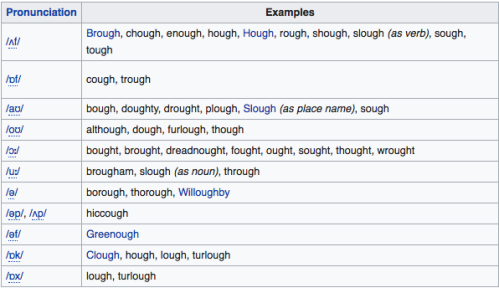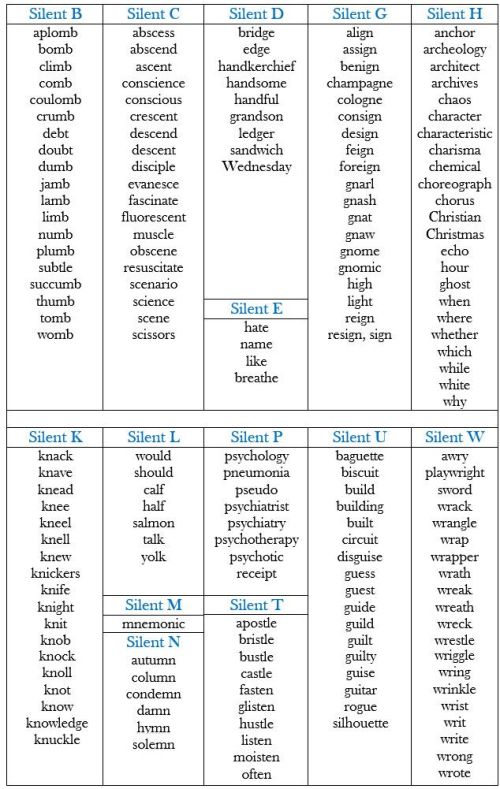20 words you may pronounce wrong
Posted in Pronunciation
Words Brits and Americans Say Differently
Posted in Phonetics, Pronunciation
Tips to write compositions
Posted in Writing
The Queen’s English
Posted in Phonetics, Pronunciation
Phonetics / Pronunciation

Posted in Phonetics, Pronunciation
Silent Letters

Posted in Phonetics, Uncategorized
Traveler Vs Tourist – Vocabulary
TRAVELLER OR TOURIST (UNIT 8B)
BUM: an idle person.
CAMPER: a person who goes camping.
COMFY: comfortable.
CULTURE VULTURE: a person who is very interested in the arts.
MUSEUM HOPPING: to visit a lot of museums.
PAMPERED: treated with excessive care and attention. Spoilt.
SEAWEED: sea plants.
SLICKER: an urban person.
SPOT: a little; a small amount.
TO GO WHERE THE WIND BLOWS: to move without planning or thinking.
TO MEANDER: to wander, to wind, to turn.
TO RAMBLE: to move aimlessly from place to place, with no specific direction.
Travelers vs Tourists
Travelers and tourists are both people who travel to different locations. The difference is that they have different connotations and that one is a broader term than the other. All tourists are travelers, but not all travelers are tourists.
The word ‘traveler’ simply means someone who travels. ‘Travelling’ itself means going from one place to the other, but it most often means going on a long journey. It isn’t very common to describe yourself as travelling when all you’re doing is going to get groceries. In the UK and Ireland, it can also mean someone who leads a nomadic lifestyle, always moving from place to place. ‘Tourist’, on the other hand, is a very specific word. It means someone who temporarily travels to another location just to enjoy the new place.
When describing people who travel to other countries, there are a few categories they can fall into. Some people have to travel for business, such as when they go to have a conference. Other people go to a place in transit. For instance, someone who wants to go from the US to Tibet would probably have to change planes in China. They would be travelling to China, but it wouldn’t be their final destination. Other people will go to places for charitable work, such as helping out with relief and aid after a major disaster. The last category is travelling for pleasure. This can mean anything from going to another country to enjoy the landscape to going to a theme park or tourist trap.
Tourists are specifically people who go to another place for pleasure when that’s the main goal of the trip. If a businessman were to take some time on his trip to experience the landscape of the place he’s in, then he wouldn’t be a tourist, since that wasn’t the purpose of the trip. Someone who travels for pleasure and takes some time to do some business work would be a tourist.
There are some who divide people who go somewhere for pleasure into travelers and tourists. According to those definitions, tourists are shallow people who care more about boasting that they were in a place than actually experiencing it, while travelers are people who blaze new trails and experience a much deeper connection with a place by going to the exact same attractions that the tourists go to, but more deeply. This is because the people who created this definition are all self-described travelers.
Tourism has gained a bit of a bad reputation. Some tourists will go to places and become a nuisance. For instance, in the United States, the Quileute reservation was damaged by tourists, though that is an extreme example. Other people will act like the stereotype of tourists. However, the majority of tourists do not – it is just far more common to hear about the horror stories than about the people who don’t do anything worth complaining about. Still, because of those people, some don’t want to be associated with the word ‘tourist’ even if they are doing the exact same things a tourist does.
It could be argued that the two words mean different approaches to travelling abroad: tourists want to have a good time with the “normal” travelling activities while travelers have fun by experiencing the culture. There’s nothing wrong with either mindset, because they’re just personal preferences.
To summarize, travelers are people who go to somewhere else. Tourists are people who go to another place to have fun. Some people prefer not to be called tourists, however, because they do not want to be associated with tourists who have behaved badly in the past.
http://www.differencebetween.net/language/difference-between-travelers-and-tourists/
Posted in Vocabulary
THE GIN EPIDEMIC – Cloze Test
CLOZE TEST
Read the text and complete the chart below with a word from the list that comes after the text. Every word can only be used ONCE. There are FIVE words that you do not need to use. Question 0 has been answered as an example.
THE GIN EPIDEMIC
Distillation was common 0) __________ Europe by the Middle Ages, but was fairly uncommon in England, compared to beer and ale production, because a national monopoly kept prices very high. In 1689, Parliament banned imports of French wines and spirits and at the same time cancelled the 1) __________ monopoly. Subsequently, anyone who could pay the required 2) __________ could set up a distillery business. Not only 3) __________ distillers become producers, but also sellers. The cost of gin fell below the cost of beer and ale and gin drinking became the favourite alcoholic beverage among the ‘inferior class’.
British statistical abstracts put the annual 4) __________ of gin in England and Wales in 1700 at about 1.23 million gallons. By 1714, consumption was up to almost 2 million gallons per year. By 1735, it was 6.4 million gallons, and by 1751, 7.05 million gallons. In terms of population, per capita intake increased by up to 5) __________ from between 1 and 2 pints in 1700 to between 8 and 9 pints, about a gallon per person, in 1751. Beer drinking for the same period remained relatively constant at 3 million gallons a year.
George, one of the most influential historians of the early 20th century, blamed the increase in gin consumption 6) __________ much of the social problems, which also increased during this period. The most commonly cited support for this argument was that, after the passage of the Tippling [1]Act of 1751, which George called a ‘7) __________ point in the social history of London, social 8) __________ declined. The Tippling Act prohibited distillers from selling gin at 9) __________, and levied severe penalties for non-compliance, such as imprisonment, whipping and even deportation for repeat offenders. As a result, gin prices rose, gin drinking steadily declined back to 2 million gallons [the intake of beer, however, steadily increased to about 4 million gallons a year and social agitation did decline. However, the social turmoil 10) _________ to and after the Tippling Act was the result of, and was fuelled and exacerbated by, excessive gin drinking, rather than having been its cause.
Adapted from: https://academic.oup.com/alcalc/article/36/5/401/233726
CONSUMPTION DOMESTIC HOUSEHOLD TROUBLE
CONSUMER DUTIES PRIOR TURNING
DECISIVE EIGHTFOLD RETAIL UNREST
DID FOR THROUGHOUT WHOLESALE
| 0 | THROUGHOUT | |||||||
| 1 | 6 | |||||||
| 2 | 7 | |||||||
| 3 | 8 | |||||||
| 4 | 9 | |||||||
| 5 | 10 | |||||||
[1] To tipple: to drink alcohol habitually
KEY
0. THROUGHOUT
- DOMESTIC
- DUTIES
- DID
- CONSUMPTION
- EIGHTFORLD
- FOR
- TURNING
- UNREST
- RETAIL
- PRIOR
Posted in Cloze tests
INTERESTING AND USEFUL WEBSITE
Click on the folliwng link to get access to different skills, such as listening, vocabulary, etc.
Posted in Listening websites, Useful websites
FECHAS DE LOS EXÁMENES DE PROMOCIÓN DE FIN DE CURSO
Podéis consultar en la página web de la Escuela de Idiomas de Santander las fechas de los exámenes de PROMOCIÓN de los cursos 1 en mayo:
https://www.eoisantander.org/alumnos-oficias/calendario-examenes/examenes-finales-cursos-1/
Posted in Exams, Notice board
Categories
- Audio Listening
- Cloze tests
- Collocations
- Exams
- GENERAL KNOWLEDGE
- Grammar
- Homework
- Idioms
- key to translations
- key to Video exercises
- Listening websites
- Matching
- Mediación
- Notice board
- Phonetics
- Pronunciation
- Quizzes
- Quotations
- Reading Comprehension
- RECOMMENDED BOOKS
- Rephrasing
- Sentence completion
- Songs
- Speaking
- Tests
- Text Completion
- Translation
- Uncategorized
- Useful websites
- Video Listening
- Vocabulary
- Word Formation
- Writing










